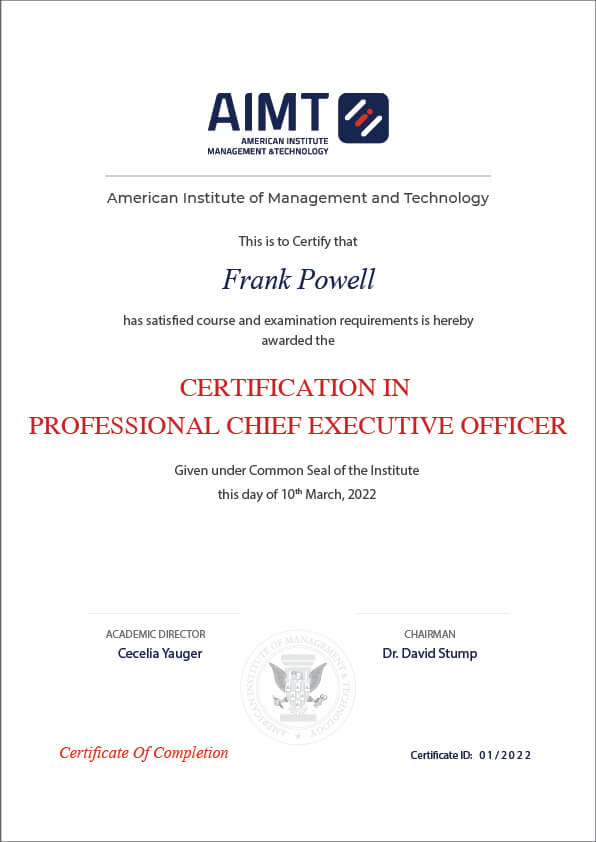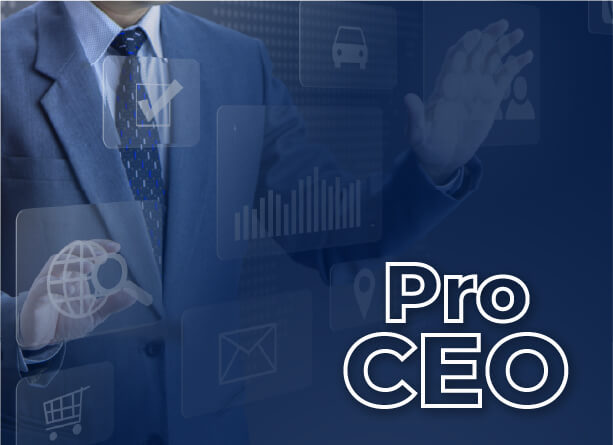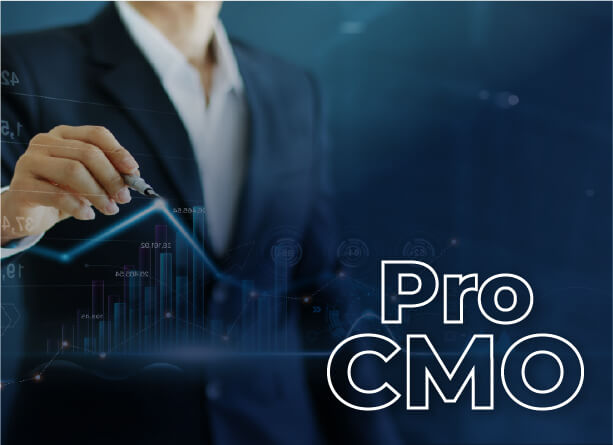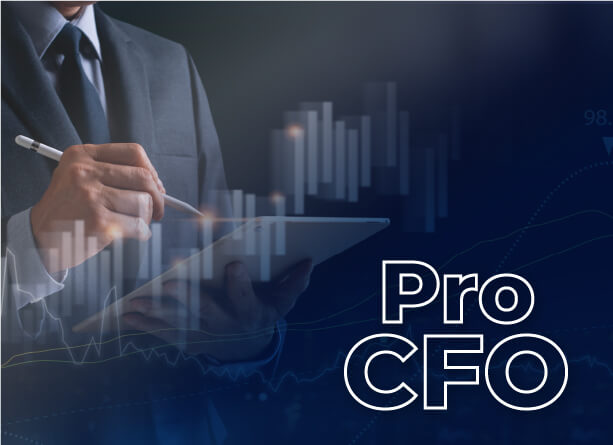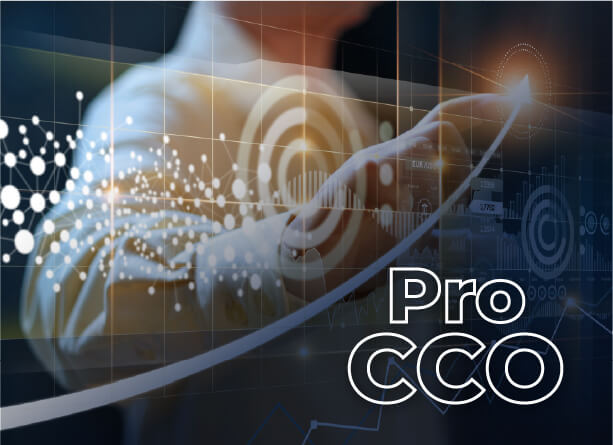Overview of Global CEO program – Professional Director Training | Pro CEO
The CEO program specialization is designed exclusively for Senior-level Business Managers and for those who are assuming the role of key strategic collaborators for the CEO or the Board of Directors in companies as well as for potential candidates who are pursuing a senior-level management advisory career in international institutions or consulting firms. Corresponding to the rapid evolution of global business with legal and regulatory financial framework changes and even the digitalization transformation; the education and training team brings together alumni network, global partners, experts, and experienced business leaders
You will therefore further enhance your particular knowledge and develop quintessential skills that are compatible with your business strategy. The program covers a wide range of areas such as Leadership, HR management, Governance, Strategy, Financial Management, IT, and Legal Practices. Emphasizing the case-study methodology and the Quintessence of our Experts community, the participants will get access to a variety of interactive training methods to be well prepared for the requirement of the CEO role. The program also features Workshops with high-level managers who will share their experience and insights into their career pathways, as well as their innovative ideas and practices that have contributed to their success.
Course Outline
- Competencies and Authorities of the CEO
- Effective Leadership and Visionary Roadmap
- Ethical and Responsible Decision-Making
- Creating a Positive Corporate Culture and Attracting Talent
- Driving Innovation and Steering Strategies
- Developing a Professional Career Plan for Staff
- Inspirational Leadership
- Business Management for a Better Working Environment
- Communicating Effectively with Stakeholders
- Developing Strategic Plans for the Company to Maximize Shareholder Value
- Implementation of the General Strategic Plan
- Driving Strategies and Providing Guidelines for the whole Enterprise Structure
- Adopting a Sustainable Development Strategy – a global, transdisciplinary vision for the future
- Development of an Annual Operating Plan
- Steering Business towards the Global Sustainable Development Goals
- Approving Enterprise Commitments within the limitations of the Board of Directors’ Delegated Approval Authorities
- The Characteristics of Innovation and the Principles of Innovation Management
- Technical and Lean Innovation Concepts
- Idea and Creativity Management
- Strengthening the Company’s Position as an Industry Leader in Smart Technology Adaptation
- Leading in-depth Analysis and Investigation into New Breakthrough Technologies
- Evaluating Creativity Proposals from Team Members and Synthesizing Technology Innovation Reports to the Board of Directors
- Designing and Structuring Your Team for Excellence
- Managing a Human Resources Strategy
- Managing Staffing, Recruitment Processes, and Staff Development Strategies
- Managing Employee Compensation Strategy
- Managing Staff Development Projects
- Managing Employee Performance
- Application of Human Capital Management Software
- Overview of General Accounting, Tax Accounting, Financial Accounting, Management
- Accounting
- Supervising the Accounting Process
- International Financial Reporting Systems
- Interpreting Financial Statements
- Financial Health Evaluation
- Driving Business Efficiency and Boosting Cost Optimization
- Forecasting Funding Needs
- Optimal Investment Decisions
- Supervising the Allocation of Resources
- Project Planning and Management
- Valuation of the Business
- Mergers and Acquisitions
- Strategic Financial Management
- Assessing the Return on Investment Ratio
- Optimal Payout Policies
- Understanding and Managing the Consumer Experience and Customer Journey
- Customer Relationship Management (CRM) and Database Marketing
- Customer Centricity – Services and Experiential Marketing
- Business Intelligence and the Future of Marketing
- Traditional Marketing, Telemarketing, Internet Marketing, and Public Relations
- Marketing (including event and sponsorship marketing)
- Services and Experiential Marketing
- Integrated Marketing Communications
- Profitability Analysis by Price, Customer, Product, and Distribution Channel
- Developing Innovative Go-to-market Programs by Segments, Personas, Business Units, and Channels
- Driving the Brand Renovation and other Brand Strategy Key Elements
- Brand Standards and Brand Architecture – Manage and Develop Guidelines for the Company’s Brand Standards
- Brand Development and Identification – Create Product Brand Identities, including tradenames, and visual identities.
- Employer Branding Development – Develop Employer Branding for Use in Talent Acquisition and Retention
- Brand Assessment: Develop and Manage Measurement Systems for Brand Valuation
- Analyzing and Reporting Brand Measurement
- Legal Systems and the Role of Regulation
- Agency and Employment Law
- International Commercial Law
- Intellectual Property Rights
- Corporate Law
- Free Trade Agreements and Trade Treaties
- Competition Law
- Quality Control Management – Ensuring Quality Integrity of Products According to Standards, Guidelines, and Policies
- Flexible Manufacturing and Operational Projects
- Automation in Production and Operational Projects
- Understanding and Improving Work Processes, Policies, and Guidelines
- Coordinating with different stakeholders for proper transfer of projects
- Executing the Proper and Agreed Process Standards
- Improving Production Efficiency, Quality, and Costs and leading the Implementation of Improvement Programs.
- Internet Technology – Cloud Computing, Social Media, Digital Apps, and E-commerce
- Structuring the Multiple E-Commerce Sales Channel and Websites to Maximize the EC sales and Profitability, and Optimize Own Website
- Exploring Types of Data and Statistical Methods Utilized for Making Relevant Business Decisions
- Developing Insights about how Companies Understand Customers through a Digital Ecosystem of Technology and Analytics
- How data visualizations improve decision making
- Evaluating ways that data-streaming sensors including (loT), Artificial Intelligence (AI), and Augmented Reality (AR) utilize data within organizations
- Identifying new Ecommerce opportunities, understanding shopper/consumer behavior journey
- Leading Ecommerce Strategies across all Brands
- Leading CRM Strategies and Customer Lifetime Value Management
- Leading Ecommerce Media Performance
- Business Intelligence Reporting
- Risk Management – Framework and Strategy
- Identifying Operational and Analytical Aspects of Risk Management and Governance
- Identifying and Managing Risks in Different Contexts
- Balancing Reform and Control
- Data Analytics and Risk Assessment in Key business Processes, such as Asset/Liability Management, Strategic Asset Allocation, and Product Development
- Monitoring and Tracking Risk Tolerance
- Managing the Company’s Risk Monitoring System
- Inspirational Leadership
- Professional Code of Ethics
- Business Management for a Better Working Environment
- Practicing Sustainability Vision, Responsibility, Professionalism, and Code of Ethics
- Social Impact Entrepreneurship and Change-making
Course Outcomes
You will master the following potentials:
Module 1: Overview of Competencies and Authorities of the CEO
- Gaining perspective on the definitions of a CEO’s competencies
- Enhancing potential leadership skills
- Understanding of corporate culture and its application to operation process and Enterprise Change Management
- Understanding the importance of Innovation in achieving your goals
- Growing awareness of the ethical and responsible working environment
Module 2: Sustainable Business Strategy
- Having a better understanding of the importance of developing an annual operating plan
- Analyzing the Strategic Management Tools and Techniques Usage
- Growing awareness of how sustainability issues influence corporate strategy and how corporations may transform these challenges into sources of competitive advantage
- Increasing awareness of long-term ethical and social-responsible commitments of the enterprise
Module 3: Accelerating Innovation and Creativity
- Adopting the Characteristics of Innovative and Creative Concepts
- Knowledge application: creating a road map for addressing critical factors in the product’s design and marketing
- Analyzing and investigating the Breakthrough Technologies
Module 4: Effective Human Resource Management Practices
- Increasing engagement and developing interpersonal skills
- Improving team dynamics through self-awareness
- Having a better understanding of team innovation and motivation
- Enhancing Performance Management Skills
- Succession Planning: Identifying and nurturing the team talent
- Boosting the team development
Module 5: Accounting for Executives
- Interpreting the Financial reports
- Understanding the core concepts, basic terms, and techniques of finance and accounting
- Applying financial concepts to make better-informed decisions and become a great asset to your company
- Getting an overview of the financial marketplace and the role of a company in today’s marketplace
Module 6: Financial Decision-making for leaders
- Having insights into the Financial Compass that CEOs need to have
- Gaining knowledge of Corporate Finance and the objective of the financial decision-making process
- Understanding Cost of Capital and Optimal Capital Structure
- Understanding the role of Financial Ratios in the Financial decision-making process
- Comprehending Mergers & Acquisitions (M&A) and Prevention Tactics
- Approaches to Business Valuation Methods
- Mastering skills to evaluate and forecast project ideas and make decisions based on different perspectives
Module 7: Marketing Management
- Understanding the importance of developing a comprehensive strategic marketing plan
- Having knowledge of Traditional Marketing, Telemarketing, Internet Marketing, and Public Relations Marketing (including sponsorship and event marketing)
- Recognizing the ethical issues that arise from marketing activities and understanding the marketing impact on society in general
Module 8: Branding Management
- Understanding Brand assessment and development in a variety of market settings, organization types, and policy situations
- Understanding how to analyze and apply marketing as well as brand communication theories
- Understanding the social, political, and cultural context of brands and their role in different areas such as retail, social marketing, and marketing ethics
Module 9: Business Law for Executives
- Understanding International Business and Commercial Laws
- Gaining essential legal knowledge to guide your business’s strategic direction, mitigate risks and make better-informed leadership development decisions
- Recognizing the pros and cons of different business structures
- Understanding the legal duties that a business leader may have
- Understanding contract structure and components in preparation for successful business deals
- Identifying of best practices required to comply with employment law
Module 10: Corporate Operations Management
- Understanding how to optimize internal business processes and systems to minimize effort as well as maximize profit
- Understanding ways to improve work and production processes
- Understanding how different facility layouts could help or potentially cause damage to a production
Module 11: E-Commerce Models and E-Business Competitiveness
- Having knowledge of planning, coordinating, and directing the computer-related activities of a business
- Understanding how information systems are used to generate information for the decision-making process
- Applying IT and Artificial Intelligence (AI) within the critical areas of management in 21st Century organizations
- Acquiring knowledge and competencies within specific areas of study or individual fields
- Understanding the foundation of ethical and professional standards
Module 12: Governance, Risk Management, and Compliance
- Understanding corporate governance and its significance to organizations
- Identifying the key characteristics of corporate governance including the role of internal audit and assurance within it
- Gaining profound insights into key principles and guidelines of risk management
- Developing risk treatment strategies
- Assessing relative benefits of embedded monitoring and independent assurance
- Adopting the principles and mechanisms used in internal control
Module 13: Leadership Manners and building personalized leadership Etiquette
- Understanding Empowerment of Organizational Leadership Capacity
- Developing core values, principles, and integrity
- Having insights into experienced leaders’ career growth through their career journeys
- Framing the relationship between personal career development and new trends in the Digital era
- Developing the ability to overcome personal difficulties, setbacks, and turbulence
- Getting prepared to become a more grounded, resilient, defensive, and perceptive leader
CEO Certificate by AIMT
- Executive Certificate Leadership et Changement by HEC Paris + $ 3000/Trainee
- London Business School Certificate Sustainability Leadership and Corporate Responsibility + $1600/Trainee
Achieve an HEC Paris Executive Education Certificate Leadership and Changement or London Business School Certificate Sustainability Leadership and Corporate Responsibility upon successful completion of the program. As an alumnus of this transformative program, you get exclusive access to a wide range of professionals, events, and networking opportunities. Furthermore, you can also benefit from additional tuition assistance on enrolling in further online electives from HEC Paris Executive Education and London Business School Executive Education
This Certificate is aimed at leaders and managers who have attended the full courses and passed the assessment to be well prepared to lead change and the transformation organizations in order to create core values for the enterprise.
